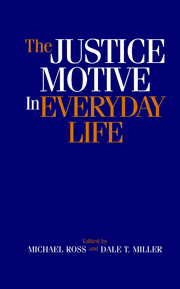Book contents
- Frontmatter
- Contents
- List of Contributors
- Introduction
- Theoretical Perspectives on the Justice Motive
- Victim Derogation and the Belief in a Just World
- The Justice Motive and Prosocial Behavior
- 11 Just World, Social Responsibility, and Helping Behavior
- 12 Policies to Redress Social Injustice: Is the Concern for Justice a Cause Both of Support and of Opposition?
- 13 Justice and Empathy: What Motivates People to Help Others?
- 14 The Justice Motive and Altruistic Helping: Rescuers of Jews in Nazi-Occupied Europe
- 15 Acting Righteously: The Influence of Attitude, Moral Responsibility, and Emotional Involvement
- Justice-Based Reactions to Transgressors
- Justice and Reaction to One's Own Fate
- Name Index
- Subject Index
14 - The Justice Motive and Altruistic Helping: Rescuers of Jews in Nazi-Occupied Europe
Published online by Cambridge University Press: 08 September 2009
- Frontmatter
- Contents
- List of Contributors
- Introduction
- Theoretical Perspectives on the Justice Motive
- Victim Derogation and the Belief in a Just World
- The Justice Motive and Prosocial Behavior
- 11 Just World, Social Responsibility, and Helping Behavior
- 12 Policies to Redress Social Injustice: Is the Concern for Justice a Cause Both of Support and of Opposition?
- 13 Justice and Empathy: What Motivates People to Help Others?
- 14 The Justice Motive and Altruistic Helping: Rescuers of Jews in Nazi-Occupied Europe
- 15 Acting Righteously: The Influence of Attitude, Moral Responsibility, and Emotional Involvement
- Justice-Based Reactions to Transgressors
- Justice and Reaction to One's Own Fate
- Name Index
- Subject Index
Summary
There are good reasons to contend that the existence of a moral order is an important precondition for predictability of the social world and meaningfulness of personal actions. If people have doubts about the moral order in their society, the feeling of anomie is likely to ensue (Merton, 1957; Korzeniowski, 1994). The basis of the moral order is a normative system supported by authorities, social institutions, and members of the society at large. It implies a general societal consensus about what is good and what is evil, as well as a stable pattern of societal behavior – the society upholds the good and repudiates the evil in its declarations and practical actions. Although there are some exceptions, good behaviors and good people (as defined by the normative system) meet with positive reactions from the society, while bad behavior and bad people meet with negative ones. People are interested in maintaining the moral order. One of the manifestations of this interest is the belief in a just world. Melvin Lerner, who formulated and together with his coworkers developed the just world hypothesis, contends that “people have a need to believe that their environment is a just and orderly place where people usually get what they deserve” (Lerner & Miller, 1978, p. 1030). There is a large body of data supporting this hypothesis (Lerner, 1970, 1977; Lerner & Miller, 1978).
- Type
- Chapter
- Information
- The Justice Motive in Everyday Life , pp. 251 - 270Publisher: Cambridge University PressPrint publication year: 2002
- 7
- Cited by

